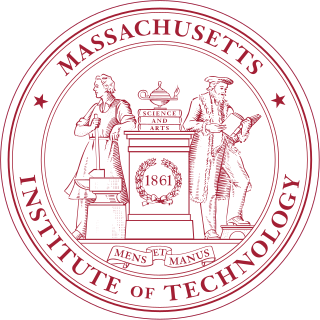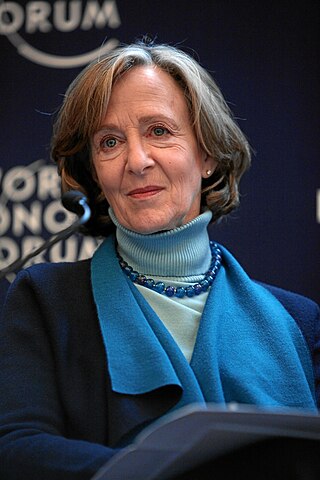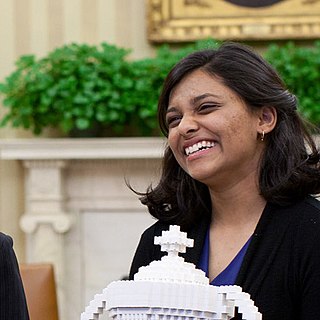Related Research Articles

The Massachusetts Institute of Technology (MIT) is a private land-grant research university in Cambridge, Massachusetts. Established in 1861, MIT has played a significant role in the development of many areas of modern technology and science.

Susan Hockfield is an American neuroscientist who served as the sixteenth president of the Massachusetts Institute of Technology from December 2004 through June 2012. Hockfield succeeded Charles M. Vest and was succeeded by L. Rafael Reif, who had served in her administration as Provost. Hockfield was the first biologist and the first woman to serve as the Institute's president. Hockfield currently serves as a Professor of Neuroscience in MIT's Department of Brain and Cognitive Sciences, a Joint Professor of Work and Organization Studies in MIT’s Sloan School of Management, and a member of the Koch Institute for Integrative Cancer Research. She is also a director of Break Through Cancer, Cajal Neuroscience, Fidelity Non-Profit Management Foundation, Lasker Foundation, Mass General Brigham, Pfizer, Repertoire Immune Medicines, and the Whitehead Institute for Biomedical Research; a lifetime member of the MIT Corporation; and a board member of the Belfer Center at the Harvard Kennedy School of Government. Before returning to MIT following her presidency, Hockfield held the Marie Curie Visiting Professorship at Harvard University's John F. Kennedy School of Government.
The Regeneron International Science and Engineering Fair (ISEF) is an annual science fair in the United States. It is owned and administered by the Society for Science, a 501(c)(3) non-profit organization based in Washington, D.C. Each May, more than 1500 students from roughly 70 countries and territories compete in the fair for scholarships, tuition grants, internships, scientific field trips and the grand prizes, including one $75,000 and two $50,000 college scholarships. All prizes together amount to over $5,000,000. Two awards ceremonies are held including: Special Awards Organization Presentation and the Grand Awards Ceremony. The International Science and Engineering Fair was founded in 1950 by Science Service and was sponsored by Intel from 1997 to 2019. Since 2020, Regeneron Pharmaceuticals is the title sponsor for ISEF, but the event that year was cancelled and replaced with an online version due to the COVID-19 pandemic.

Nancy Hopkins, an American molecular biologist, is the Amgen, Inc. Professor of Biology at the Massachusetts Institute of Technology. She is a member of the National Academy of Sciences, the Institute of Medicine of the National Academy, and the American Academy of Arts and Sciences. She is known for her research identifying genes required for zebrafish development, and for her earlier research on gene expression in the bacterial virus, lambda, and on mouse RNA tumor viruses. She is also known for her work promoting equality of opportunity for women scientists in academia.

JoAnne Stubbe is an American chemist best known for her work on ribonucleotide reductases, for which she was awarded the National Medal of Science in 2009. In 2017, she retired as a Professor of Chemistry and Biology at the Massachusetts Institute of Technology.

Felice Frankel is a photographer of scientific images who has received multiple awards, both for the aesthetic quality of her science photographs and for her ability to effectively communicate complex scientific information in images.
Phyllis Ann Fox was an American mathematician and computer scientist.

Jack Thomas Andraka is an American who, as a high school student, won the Gordon E. Moore Award at the 2012 Intel International Science and Engineering Fair with a method to possibly detect the early stages of pancreatic and other cancers. In 2018, as a junior majoring in anthropology and in electrical engineering at Stanford University, he was awarded the Truman Scholarship for his graduate studies.
Henry Wanjune Lin is an American student who won the $50,000 Intel Young Scientist award, the second-highest award at the 2013 Intel Science and Engineering Fair for his work with MIT professor Michael McDonald on simulations of galaxy clusters. In 2015, he was named one of Forbes' 30 under 30 scientists.
Radhika Nagpal is an Indian-American computer scientist and researcher in the fields of self-organising computer systems, biologically-inspired robotics, and biological multi-agent systems. She is the Augustine Professor in Engineering in the Departments of Mechanical and Aerospace Engineering and Computer Science at Princeton University. Formerly, she was the Fred Kavli Professor of Computer Science at Harvard University and the Harvard School of Engineering and Applied Sciences. In 2017, Nagpal co-founded a robotics company under the name of Root Robotics. This educational company works to create many different opportunities for those unable to code to learn how.
Jay Saul Silver is an electrical engineer and toy inventor from Cocoa Beach, Florida. Silver is the Founder and CEO of JoyLabz and MaKey MaKey and was the first-ever Maker Research Scientist at Intel.
Dianne Newman is a molecular microbiologist, a professor in the Division of Biology and Biological Engineering and the Division of Geological and Planetary Sciences at California Institute of Technology. Her research interests include bioenergetics and cell biology of metabolically diverse, genetically-tractable bacteria. Her work deals with electron-transfer reactions that are part of the metabolism of microorganisms.
Keiana Ashli Cavé is an American entrepreneur, scientist and public speaker. She received $1.2 million in research funding from Chevron in 2016, who acquired her company in 2017.

Ann Makosinski is a Canadian inventor and public speaker. She is best known for her invention of the thermoelectric flashlight in 2011.

Canan Dağdeviren is a Turkish academic, physicist, material scientist, and assistant professor at the Massachusetts Institute of Technology (MIT), where she currently holds the LG Career Development Professorship in Media Arts and Sciences. Dagdeviren is the first Turkish scientist in the history of the Harvard Society to become a Junior Fellow in the Society of Fellows at Harvard University. As a faculty member, she directs her own Conformable Decoders research group at the MIT Media Lab. The group works at the intersection of materials science, engineering and biomedical engineering. They create mechanically adaptive electromechanical systems that can intimately integrate with the target object of interest for sensing, actuation, and energy harvesting, among other applications. Dagdeviren believes that vital information from nature and the human body is "coded" in various forms of physical patterns. Her research focuses on the creation of conformable decoders that can "decode" these patterns into beneficial signals and/or energy.

Shree Bose is an American scientist, inventor, and speaker. She is known as the grand prize winner of the inaugural Google Science Fair in 2011. She is currently a member of the Physician Scientist Development Program (PSDP) program at the University of Chicago Medical Center, having graduated with an MD–PhD from Duke University School of Medicine in 2023. For high school, she went to Fort Worth Country Day and graduated in May, 2012. She studied at Harvard College until May 2016. In 2014, she cofounded Piper, a STEM education company creating engineering kits for children.

Prineha Narang is an American physicist and computational material scientist. She is a Professor of Physical Sciences and Howard Reiss Chair at the University of California, Los Angeles (UCLA). Narang currently serves as a U.S. Science Envoy approved by the Secretary of State to identify opportunities for science and technology cooperation. Before moving to UCLA, she was first an Environmental Fellow at Harvard University Center for the Environment and then an Assistant Professor in the John A. Paulson School of Engineering and Applied Sciences at Harvard University. Narang’s work has been recognized internationally by many awards and a variety of special designations, including the Mildred Dresselhaus Prize, the 2021 IUPAP Young Scientist Prize in Computational Physics, a Friedrich Wilhelm Bessel Research Award from the Alexander von Humboldt Foundation, and a Max Planck Sabbatical Award from the Max Planck Society. Narang also received a National Science Foundation CAREER Award in 2020, was named a Moore Inventor Fellow by the Gordon and Betty Moore Foundation for the development for a fundamentally new strategy for single molecule sensing and environmental toxin metrology using picoscale quantum sensors, CIFAR Azrieli Global Scholar by the Canadian Institute for Advanced Research, and a Top Innovator by MIT Tech Review. Narang was awarded a Guggenheim Fellowship in 2023.

Allison Koenecke is an American computer scientist and an assistant professor in the Department of Information Science at Cornell University. Her research considers computational social science and algorithmic fairness. In 2022, Koenecke was named one of the Forbes 30 Under 30 in Science.
Anjali Chadha is an American bioengineer. She is an ambassador for AAAS If/Then. She was named a 2020 Voices Of the Year, by Seventeen magazine.
References
- 1 2 3 "A material difference". MIT News | Massachusetts Institute of Technology. 2021-07-25. Retrieved 2023-08-24.
- 1 2 "Eesha Khare". TEDxTeen. 2017-03-25. Retrieved 2023-08-24.
- ↑ "Eesha Khare". hcs.uraf.harvard.edu. Retrieved 2023-08-24.
- ↑ "Eesha Khare | Laboratory for Atomistic and Molecular Mechanics". lamm.mit.edu. Retrieved 2023-08-24.
- ↑ "Eesha Khare". Forbes. Retrieved 2023-08-24.
- 1 2 "Wie super ist der Superkondensator? - WELT". DIE WELT (in German). 2017-08-30. Retrieved 2023-08-24.